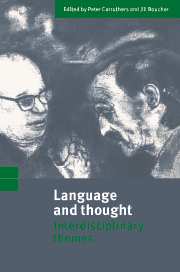Book contents
- Frontmatter
- Contents
- List of contributors
- Preface
- 1 Introduction: opening up options
- Part I Language, development and evolution
- Part II Language, reasoning and concepts
- Introduction to part II
- 6 Aphasic language, aphasic thought: an investigation of propositional thinking in an a-propositional aphasic
- 7 Representing representations
- 8 Magic words: how language augments human computation
- 9 The mapping between the mental and the public lexicon
- 10 Convention-based semantics and the development of language
- Part III Language and conscious reasoning
- References
- Author index
- Subject index
7 - Representing representations
Published online by Cambridge University Press: 08 January 2010
- Frontmatter
- Contents
- List of contributors
- Preface
- 1 Introduction: opening up options
- Part I Language, development and evolution
- Part II Language, reasoning and concepts
- Introduction to part II
- 6 Aphasic language, aphasic thought: an investigation of propositional thinking in an a-propositional aphasic
- 7 Representing representations
- 8 Magic words: how language augments human computation
- 9 The mapping between the mental and the public lexicon
- 10 Convention-based semantics and the development of language
- Part III Language and conscious reasoning
- References
- Author index
- Subject index
Summary
Introduction
Sally believes that Anne is a doctor. Zoe believes this, and can say that it is so. She does so by uttering (1):
(1) Sally believes that Anne is a doctor.
Propositional attitude reports like (1) have received a great deal of attention in the philosophical literature over the last hundred years.
Since Zoe believes that Sally believes that Anne is a doctor, and Zoe is a common-sense psychologist, she is in a position to infer much about Sally's mind and actions. Zoe might infer that Sally has a belief about Anne. She might infer that Sally believes that at least one doctor exists. She might also infer that if Sally wants to talk to a doctor, and further believes that Anne is available for discussion, then Sally might seek Anne out. She would be likely to infer these and many other things, if she bothered to think about them.
Common-sense psychology has received considerable attention from philosophers and, more particularly from developmental and experimental psychologists, particularly since Heinz Wimmer and Josef Perner (Wimmer and Perner, 1983) began to explore children's understanding of false beliefs. Psychologists study the basis of common-sense psychology – what it consists in – which types of beings possess it, how it is acquired and so on.
There has been a certain amount of fruitful interaction between the philosophers of language and the psychologists who study theory of mind. I would like to contribute to this pooling of resources, and bring in some linguistics as well.
- Type
- Chapter
- Information
- Language and ThoughtInterdisciplinary Themes, pp. 146 - 161Publisher: Cambridge University PressPrint publication year: 1998
- 9
- Cited by



